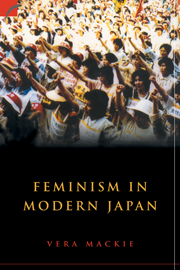6 - Citizens
Published online by Cambridge University Press: 22 September 2009
Summary
Out of the darkness
In 1911, when I was twenty six years old, I lamented that ‘In the beginning woman was the sun. An authentic person. Today, she is the moon; living through others; reflecting the brilliance of others.’ But now, thirty seven years later, I am overjoyed, and want to cry out: ‘Look! The day has come! Now is the time. A big, big sun is shining out from the hearts of Japanese women!’
Hiratsuka Raichō was reflecting on the massive changes which had happened in the social and legal context in which Japanese women now operated. By the time she wrote this, in October 1948, there had been two postwar national elections which had seen women participating as voters and as candidates. There was a new Constitution which guaranteed freedom from sexual discrimination, and a revised Civil Code which included reform of family law and the creation of legislation specifically directed at the conditions of working women. On the international scene, the United Nations had replaced the prewar League of Nations and in December 1948 issued the Universal Declaration of Human Rights.
Hiratsuka's jubilation was due to the fact that many of the institutional changes she and her sisters had called for in the first half of the twentieth century were finally being put into place.
- Type
- Chapter
- Information
- Feminism in Modern JapanCitizenship, Embodiment and Sexuality, pp. 120 - 143Publisher: Cambridge University PressPrint publication year: 2003

